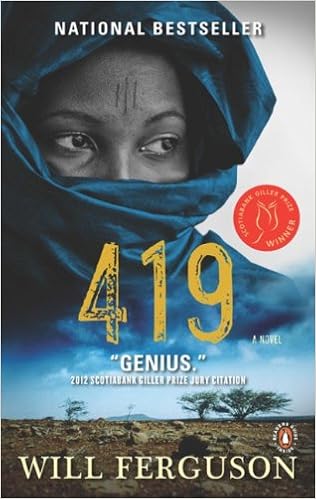3.5 Stars
 This novel
won the 2012 Scotiabank Giller Prize, but I never read the book until now
because it’s on my book club’s reading list.
I’m not totally convinced that it’s worthy of the award.
This novel
won the 2012 Scotiabank Giller Prize, but I never read the book until now
because it’s on my book club’s reading list.
I’m not totally convinced that it’s worthy of the award.
After her
father dies in a suspicious car crash, Laura Curtis learns that he fell victim
to a Nigerian email scam which has left his widow virtually destitute. This plot in Canada is eventually connected
to three characters in Nigeria. Winston
is an email scammer who has little future in his home country. Amina is a young pregnant woman fleeing
tribal connections in the north and looking for a new life in the south. Nnamdi is a young man who becomes a player in
the black market after his home region, the Niger Delta, is devastated by
irresponsible oil drilling.
The novel examines
the theme of exploitation – how the hunted become the hunter become the hunted
in a seemingly endless cycle. Laura’s
brother, feeling his family to be victims of scammers, becomes a
scambaiter. Laura sets out to get
restitution and revenge but ends up a victim too. Some of the 419 internet scammers see their
activities as payback for the raping of Nigeria by white men, revenge for the
scourges of colonialism. Winston, as one
of the scammers, is a hunter but he becomes the prey of a criminal
mastermind. Nnamdi is a victim of the
oil companies and their irresponsible drilling and so he becomes a predator,
using skills taught him by the companies and becoming involved in a scheme to
sell stolen oil to the government: “illegal fuel to a legal depot” (229). But
then he becomes a pawn in someone else’s criminal activities.
One can even
go back in history to see exploitation and its consequences. As Nnamdi admits, his people, the Ijaw,
kidnapped people for slavers, and tribal animosities remain: “’We Ijaw captured and sold a lot of Igboos
over the years. They are still mad at us
about that’” (262). Nnamdi believes “the Ijaw had never been subjugated, never
been enslaved. They had been the
hunters, not the prey.” But this is not really true. Now the Niger Delta, the homeland of the Ijaw,
is exploited by foreign oil companies; the entire ecosystem of the delta has
been devastated and their livelihoods destroyed. Many Ijaw see the oil-revenue sharing formula
with the Nigerian Federal government as unfair so there have been several high-profile
clashes with federal authorities, including kidnappings like the one described
(266-267). It becomes difficult to
determine who is the exploiter and who is exploited.
I had some
difficulty with characterization.
Perhaps I’m naïve but I found Henry Curtis’ gullibility
unconvincing. He was an educated man and
would surely have heard about internet scams via the media. No year is indicated in the correspondence
with Henry, but the police already know exactly how the scams work so they are
obviously not new crimes. Laura is a
mild-mannered copyeditor who transforms into a fearless scambuster who manages
to outwit some of the bad guys? But then
after her experiences, she shows surprising naivety. Amina remains flat because little of her
background is given. We never learn why
she is so determined to escape from northern Nigeria though we might speculate
that her pregnancy has something to do with it.
Nnamdi is well developed, but he seems to transform into a mechanical
wizard very quickly. His devotion to
Amina is not explained to my satisfaction; he meets her and immediately takes
her under his care?
Ferguson’s
experience as a travel writer and humourist are obvious in this book. His descriptions of Nigeria (language, food,
customs, ethnic divisions, politics) make the country come alive. His descriptions of Calgary seem bland by
comparison. There is not much humour,
but for the visit with Winston’s parents.
(And their blindness to Winston’s activities mirrors the Curtis family’s
blindness to Henry’s.)
This is
what I would consider a solid book. Its
weaknesses in characterization, however, are not what I expect in a Giller
Prize winner. Perhaps the other
contenders were not strong either.
No comments:
Post a Comment